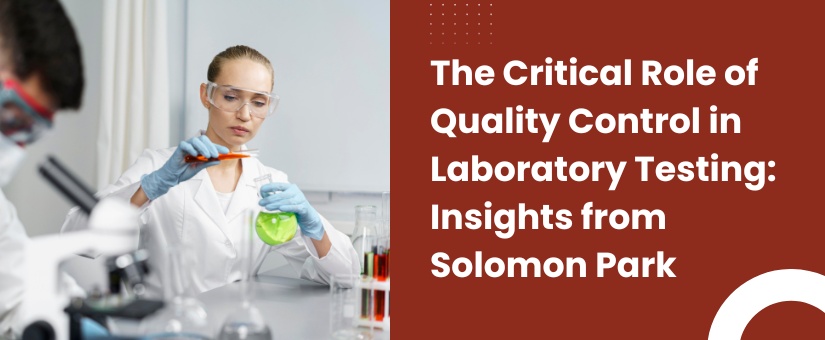Laboratory testing serves as the backbone of diagnosis and treatment in the healthcare industry, playing a vital role in the early detection of diseases, monitoring patient progress, and guiding therapeutic decisions. The integrity of these tests is non-negotiable. This is where the critical role of quality control in laboratory testing comes into sharp focus. Solomon Park, a leader in medical laboratory services, underscores the importance of stringent quality control measures to ensure the accuracy and reliability of test results.
Understanding Quality Control in Laboratory Testing
Quality control in laboratory testing refers to the set of procedures undertaken by laboratories to ensure that test results are both accurate and reliable. These procedures help in identifying and minimizing errors in the testing process, which can stem from various sources such as faulty equipment, human error, or the use of contaminated reagents. As Solomon Park illustrates, lab quality control is not just a regulatory requirement. It is a fundamental aspect of laboratory operations that safeguards patient health and enhances healthcare outcomes.
The Pillars of Lab Quality Control
In the world of medical diagnostics, the assurance of accuracy and reliability in laboratory results is paramount. This assurance is underpinned by a rigorous framework known as lab quality control, a cornerstone of medical laboratory operations that safeguards the integrity of testing processes and outcomes. As we look at the critical components that constitute this framework, it becomes evident that lab quality control is not merely a set of procedures. It is a comprehensive approach to maintaining excellence in healthcare diagnostics. Every test conducted must not only meet, but exceed, the standards expected by both healthcare professionals and patients alike.
Solomon Park’s approach to medical laboratory quality control rests on several key pillars:
Standardization of Procedures
The foundation of reliable lab testing lies in the standardization of procedures. This involves the use of validated methods and protocols for every test performed. By standardizing how tests are conducted, laboratories can reduce variability in results, ensuring that outcomes are consistent over time and comparable across different settings.
Calibration and Maintenance of Equipment
Sophisticated laboratory instruments require regular calibration and maintenance to function at their optimum. Calibration ensures that equipment is producing accurate measurements, while maintenance prevents the deterioration of these instruments over time. Solomon Park emphasizes the importance of a systematic schedule for both activities, as even the most minor deviation in equipment performance can lead to significant inaccuracies in test results.
Use of Control Samples
A crucial aspect of lab quality control involves the use of control samples. These are specimens known to contain specific substances at definite concentrations. By running control samples alongside patient samples, laboratories can verify that tests are working as expected. Any discrepancy in the results of control samples triggers an investigation into potential issues within the testing process.
Proficiency Testing
Proficiency testing involves the external evaluation of a laboratory’s testing accuracy. Laboratories receive blinded samples from an external agency and are required to analyze them as they would patient samples. The results are then compared with those from other laboratories. Solomon Park participates in proficiency testing programs to benchmark our performance and identify areas for improvement.
Continuous Training of Personnel
The competence of laboratory personnel is crucial to ensuring quality in laboratory testing. Continuous training programs keep staff updated on the latest testing methodologies, quality control measures, and technological advancements. Solomon Park prioritizes the ongoing education and certification of our team to maintain a high standard of expertise.
The Impact of Quality Control on Healthcare
The implementation of quality control within laboratory settings extends far beyond the confines of ensuring accurate test results; it fundamentally transforms the landscape of healthcare. By weaving together the threads of rigorous standards, technological advancements, and skilled personnel, quality control acts as the backbone of medical diagnostics, ultimately shaping the efficacy of treatments and the well-being of patients worldwide.
The rigorous implementation of quality control measures in laboratories like Solomon Park has a profound impact on healthcare:
Enhancing Diagnostic Accuracy
The primary benefit of stringent quality control is the enhancement of diagnostic accuracy. Accurate test results lead to correct diagnoses, which are essential for effective treatment. This reduces the likelihood of misdiagnosis, unnecessary treatments, or delays in providing the right intervention.
Increasing Patient Safety
Quality control measures directly contribute to patient safety by minimizing the risk of errors that could lead to adverse outcomes. This is especially critical in high-stakes testing, where errors could have life-threatening consequences.
Building Trust in Healthcare
When patients and healthcare providers can trust the results provided by medical laboratories, it builds confidence in the healthcare system as a whole. Solomon Park’s commitment to quality control not only ensures the reliability of its testing services but also reinforces the trust placed in it by the medical community and patients alike.
Cost-Effectiveness
By preventing errors and ensuring accurate diagnoses, quality control in laboratory testing also contributes to the cost-effectiveness of healthcare. It reduces the need for repeat testing, unnecessary treatments, and the management of complications arising from incorrect diagnoses.
Conclusion
Quality control in laboratory testing is an indispensable part of healthcare, ensuring that every test result from a laboratory is accurate, reliable, and timely. Solomon Park’s dedication to excellence in lab quality control exemplifies the commitment required to uphold the highest standards in medical laboratory testing. As we continue to navigate the complexities of healthcare, the role of quality control in laboratories remains paramount, safeguarding patient health and enhancing the efficacy of medical treatments across the globe. Through meticulous attention to quality control processes, laboratories like Solomon Park are not just performing tests; they are preserving the integrity of healthcare itself.

